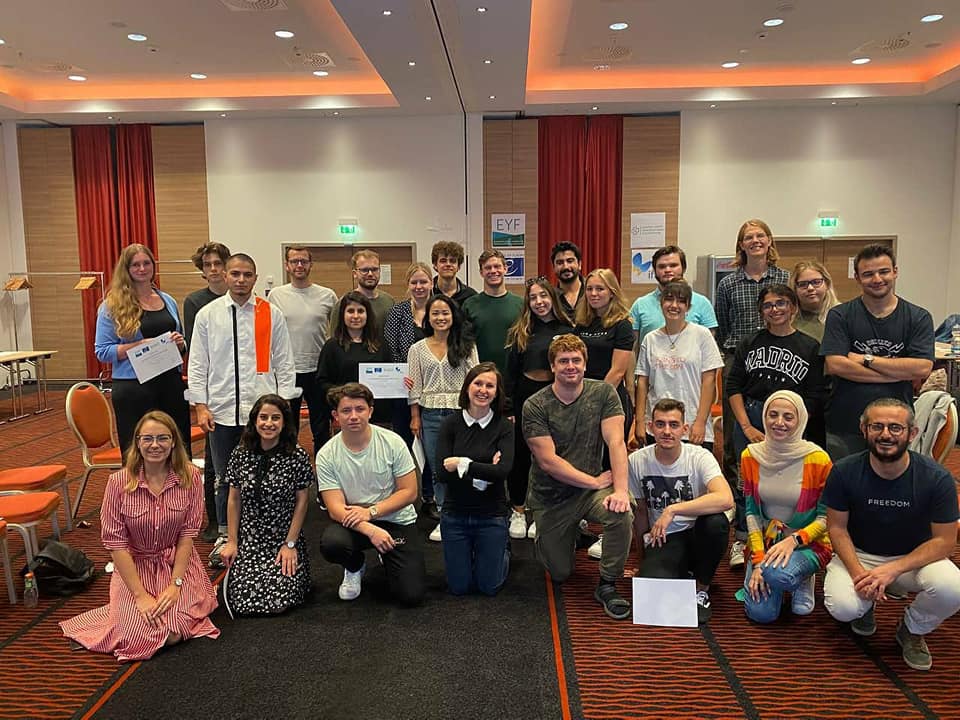August 2021, Berlin

The over the course of four days, participants of the seminar BootCamp Political Leadership: Empathy, Branding, Twitter got a chance to reflect on political leadership, and then use these reflections to come to a better understanding of their own leadership skills, as well as their potential for developing these skills further. Participants arrived during the morning and early afternoon on day one, after which the seminar started off with introductions, teambuilding, setting the rules of the seminar and discussing participants’ expectations, fears and goals.
The second day started with a broad discussion was in which participants had a chance to think through their ideas of leadership. This discussion was then followed up by small-group sessions, in which participants were asked to present the leadership characteristics they find most important in the form of a poster. The skills that were mentioned by almost all groups were effective communications, creativity, vision, conflict management and reliability.
Discussions on the characteristics of good leaders were followed by a series of bootcamp sessions in which focused on the development of different leadership skills. There were sessions on public speaking, digital communications, storytelling, functioning under pressure, and empathy. After this, a feedback and reflection session was held, in which participants had the opportunity to share what they had taken from the sessions, and how they thought they could implement the lessons into their work going forward. This was then followed up by a session in which participants were asked to write down their strengths and weaknesses vis a vis the leadership skills that had been discussed so far. They were then instructed to have one on one discussions with people who had listed their weaknesses as strengths and vice versa. Which resulted in in-depth discussions that increased participants’ understanding of themselves.
We had moved the seminar from Brussels to Berlin in order for participants to experience the German elections that were in full swing. However, what we had not accounted for was that the election campaign would make it harder for us to find speakers because so many of them were preoccupied with campaigning. Although we had hoped to create a panel for the morning of day three, in the end we only found two speakers, and decided to let them speak separately. Luckily both were excellent. We started off with Julius Graack of the Junge Liberale, who explained to us in great detail how they were running their campaign, how the JuLis chose to focus on issues that emphasized digitalisation and creating opportunities for young people, and how they got those messages across to young and first-time voters with a budget of € 20.000. Next up was Glacier Kwong, who is presently living in exile in Hamburg, because of her involvement in the protest movement in Hong Kong. Her description of her involvement in the movement gave a great insight into leaderless protests, something that was difficult to imagine concretely, and which Glacier explained some of the people she was active with in the movement are now studying at universities in Europe and the US. Her open and honest discussion of the difficulties and the stress she faced deeply moved the participants. And the group hug we all gave her in the end was quite emotional for the whole group.
The day then continued with a programme devised for us by the Junge Liberale international officer and candidate for the Bundestag Alice Schmidt. As a continuation of Glacier’s talk about Hong Kong, she first took us to the Chinese Embassy for a protest against the PRC’s repressions of dissidents in Hong Kong and Tibet, and against the genocide currently going on in Xinjian (or East Turkestan). After this we proceeded to campaign in Alice’s constituency on the outskirts of Berlin, handing out flyers and talking about how Alice and the people who were supporting her campaign were engaging with voters. After this we returned to town to join another candidate in the inner-city area of Kreuzberg, to continue campaigning there.
Besides reflection on what they had learned the previous days, the final day was one in which participants put together a starter pack for other political leaders, in which they put together materials that help them get a sense of what is required of them and instruct them on how to find their purpose and inspire others.
The team for the seminar was comprised of a highly diverse group of people from mid 20s to early 30s, all from different countries (Germany, Netherlands, Sweden, Jordan, Turkey, Ukraine and China/Hong Kong), all with different backgrounds and skillsets. The team was led by IFLRY Executive Director Hussam Erhayel from Jordan who, through his work at the Friedrich Neumann Foundation in Amman and previous trainings at IFLRY has acquired a wealth of experience at both giving and coordinating seminars. Katharina Schreiner, the former international officer of the Junge Liberale, who was also part of the team. As a member of the IFLRY Pool of Trainers, she has worked on many seminars in the past. Oscar Matti brought in the communication and coordination experience he acquired by working in regional politics in Uppsala, Sweden. IFLRY vice-president Yevheniia Fedotova, who works at a digital advertising company in her native Ukraine, brought in her online communication skills, as well as her experience training at other IFLRY seminars. Serkan Can from Turkey brought with him his experience of taking part in protests in Istanbul as well as his involvement in the 3H Movement in Turkey. Krijn van Eeden, who has been active for IFLRY as editor of their online magazine Libel for several years, brought in his expertise volunteering and giving trainings for a student emotional support helpline, to train participants on listening and empathy skills. Finally, although Glacier Kwong was mainly invited as a speaker, she also contributed by leading a session on mental health — particularly functioning, and taking care of yourself under stress — in which she used her experiences in Hong Kong to make participants aware of, and give them tools on how to deal with the mental toll it can take to be under pressure and indeed in the kind of danger that being a political activist in Hong Kong exposed her to.
As for the participants, we had a diverse group from ten different countries: Azerbaijan, Turkey, Jordan, Bulgaria, the Netherlands, Germany, the Czech Republic, Poland, Austria and Hungary. Some notable people included two political youth activists and trainers from Jordan, a young political organiser and candidate from the Czech Republic, from Hungary two youth activists, young entrepreneurs from the Netherlands and Austria, and two young political activists from Bulgaria.
